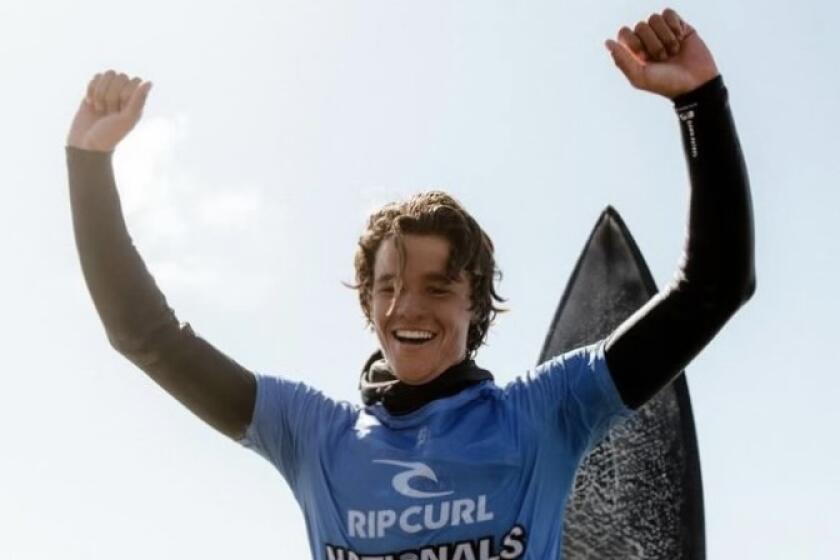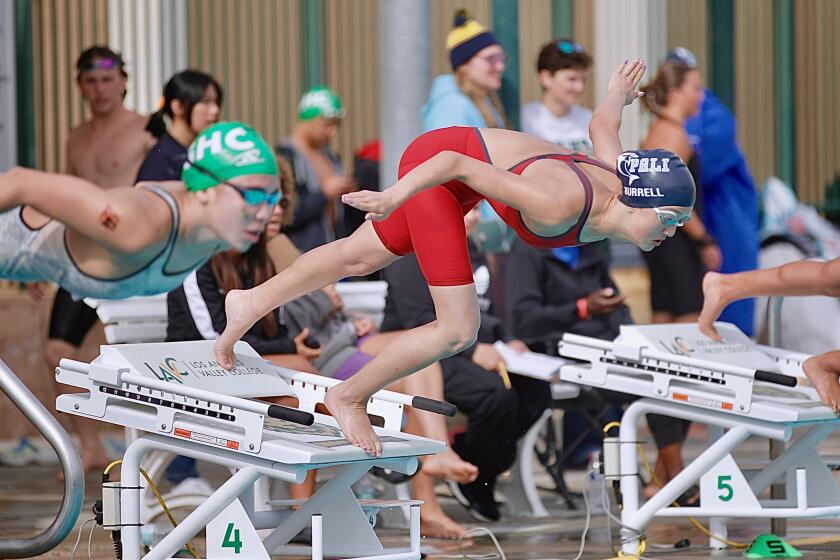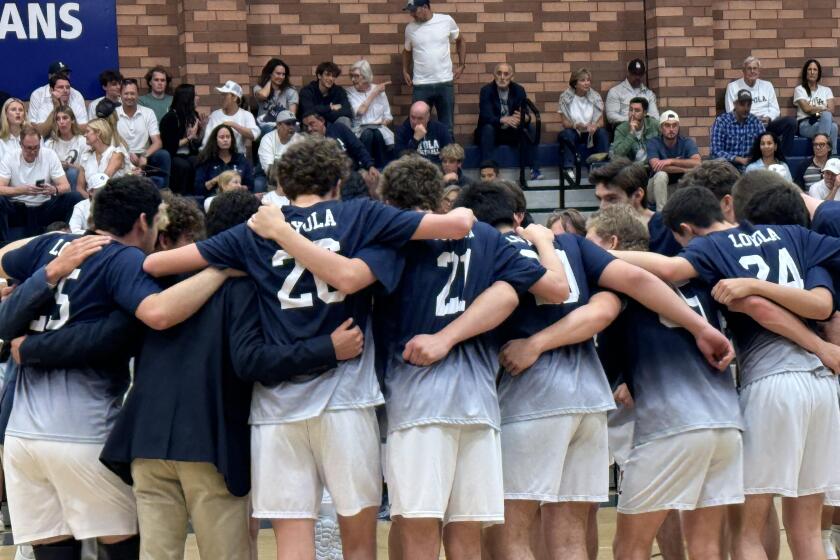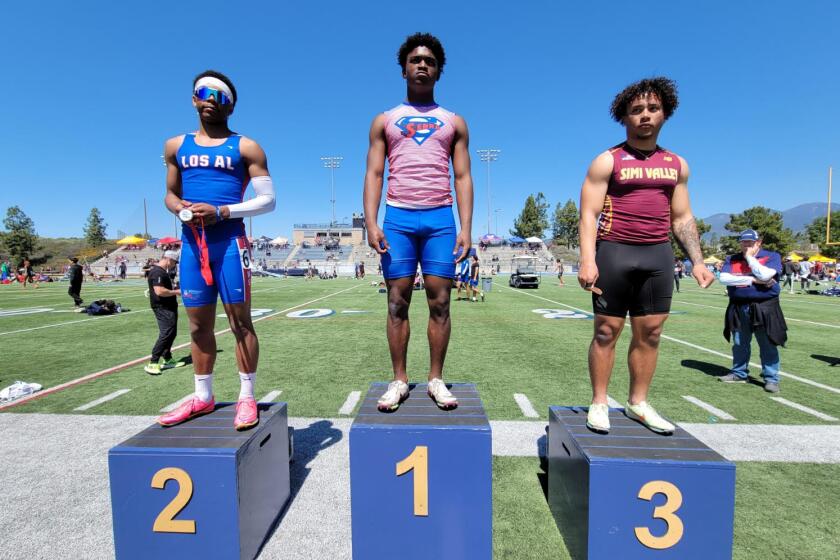POINTS NOT WELL-TAKEN : Animosity Abounds When Teams Run Up the Score, but Coaches Differ on Where to Draw the Line
As his second-string quarterback barked out an audible at the line of scrimmage, Chaminade High Coach Rich Lawson knew he was in trouble.
Greg Baumgartner correctly read the Harvard defense and did exactly as he was coached. He changed the play to a quick pass and threw to Sean Warner for a 3-yard touchdown in last year’s game at Harvard.
Lawson could not help feeling proud of his junior quarterback, but he braced himself for the attack he knew was headed his way. The pass from Baumgartner came with Chaminade leading, 32-7, in the fourth quarter of a game the Eagles won, 46-7.
Because Lawson--then in his first year as a head coach--apparently had broken the unwritten rule among coaches that calls for mercy in one-sided games, he averted his eyes from the steely glare of Harvard Coach Gary Thran on the other side of the field.
“My assistant coaches were telling me that Thran was waving his fist at me but I didn’t look myself,” Lawson said. “I knew he was upset and I didn’t feel too good about what happened. You shouldn’t embarrass another program, but I was proud of Baumgartner. He showed me that he was sharp and that he listened in practice.”
The incident represents a seemingly unavoidable occupational hazard in a profession that attracts strong egos and measures success in a clear-cut fashion: the scoreboard. And when the scoreboard tilts too much to one side, hard feelings often follow.
“You’ve got to have some Jack Dempsey in you in this business, a killer instinct,” Cleveland Coach Steve Landress said. “If you have the ball, you’re not worried about that guy’s feeling across the field. But coaches are often friends and it’s ugly when you lose. After the game you look in their eyes and know they’re going to have a long weekend. And you’re waiting to get to El Torito and celebrate.”
Perhaps the unwritten rule about calling off the dogs stems from that understanding, but compassion rates low on a coach’s priority list. His first obligation is to his players. And that’s often where the trouble starts.
“I would never tell my guys to go easy,” Lawson said. “That’s bad coaching and it confuses kids. You tell them to turn it on and keep it on until the final whistle blows. No one wants to humiliate the other team, but if we score 30 or 40 points and our defense shuts out the other team, well, that’s what we work hard to do.”
Nearly all coaches embrace that philosophy. Few say that they intentionally run up the score but all admit it happens. If a coach stays around long enough, he is bound to experience life at both ends of a blowout. Even the big winners such as Canyon’s Harry Welch, who owns a 78-12 career record, have searched for the white flag while enduring a game from the wrong end of a rout.
“When the dam bursts, you tend to get very emotional,” Welch said about last season’s 42-6 playoff loss to Channel Islands. “What I ought to do the next time that happens is call a timeout. I’ll tell the other coach, ‘I’m banged up and I concede.’ ”
Softball has a mercy rule and some high school leagues employ a similar rule in baseball, but it is unlikely that such a policy will be adopted for football, even though teams sometimes are literally beaten. Perhaps in no other sport is a rout so painful as in football, which demands intense physical contact no matter what the score.
The National Federation of State High School Athletic Assns. has polled coaches for their views on a mercy rule similar to the one used at the 8-man level in California. If a team leads by 45 points or more at halftime or the lead reaches 45 points in the second half, the game is stopped. Bill Clark, the Southern Section administrator in charge of football, said that there has been no groundswell of support for such a rule at the 11-man level.
In the absence of such a rule, each season likely will include its share of coaches’ squabbles. Welch was criticized after his team walloped Burroughs of Ridgecrest, 58-6, in October. On the same night, Alemany’s Pat Blackburn refused to shake hands with Bill Redell after Redell’s Crespi team blanked Alemany, 49-0.
So the problem--and questions--endure.
How much is too much?
The final score is often deceptive. When Crespi beat Taft last season, 44-0, Toreador Coach Tom Stevenson thanked Redell afterward. “I thought he was kind to us,” Stevenson said. “They probably could have scored 80 points.”
Westlake’s George Contreras had a similar reaction after his team was crushed by Darryl Stroh’s 1986 Granada Hills team, 56-12. Said Contreras: “They ran a fullback up the middle and he went for a 40-yard touchdown. I don’t think Darryl can get any more basic than that.”
When Granada Hills routed Cleveland, 55-6, in the semifinal round of the City Section 4-A Division playoffs last season, Landress held no grudge. “You want to get mad at somebody but you can’t tell a guy not to throw the ball in the fourth quarter. If it’s in the rules, then it’s fair.”
Perhaps it is ironic that in the same season, Landress was accused of running up the score in a game his team won, 13-6. Cleveland led, 7-6, in the closing seconds of the season opener against Chatsworth and had driven the ball to the Chancellor 3-yard line as the clock was about to run out. But with 3 seconds left, Cleveland quarterback Jamie Grossman called a timeout.
Landress was upset and sent in a conservative running play up the middle that had little chance of working. But Grossman, like Chaminade’s Baumgartner, was well-coached. He called an audible at the line of scrimmage based on the Chatsworth defense, and fullback Mark Mooney ran a sweep into the end zone on the last play of the game.
Chatsworth Coach Myron Gibford screamed his objection afterward and Landress countered with a 2-word response unprintable in a family newspaper.
“He didn’t give me a chance to explain and I didn’t want to take any guff after a victory,” Landress said.
Who are the bad guys?
Reputations start on the field and grow on the coaches’ grapevine. Lawson claims that his name went out on the wire after Chaminade swept to the Santa Fe League championship last season. He says his reputation as a ruthless winner cost Eagle running back Tim Lavin the league’s back of the year award in ’87 that went to Harvard’s Marty Holly based on a vote by league coaches.
“Coaches try to take their frustrations out at other coaches by taking it out on a kid, and that’s unfair,” Lawson said.
Thran claims innocence in light of Lawson’s charges, saying Holly deserved the award.
“I can’t speak for the other coaches but I hope nothing like that happened. I know I didn’t vote that way because of what happened on the field,” he said.
Another name that hits the grapevine is Welch. The Canyon coach did little this year to diffuse his reputation for rolling up larger-than-necessary scores with the victory over Burroughs. Welch substituted as early as the second quarter, but starting tailback Chris Peery scored in the fourth quarter and the Cowboys tried an onside kick in the second half of a game they led at halftime, 38-6. Welch defended the onside kick, saying he wanted his third-string offense to get a chance to play.
“We don’t cut anybody and if we get a chance to play our third-string guys I think that’s wonderful,” Welch said. “Your team having the ball has nothing to do with running up the score. What you do after you get the ball is the key.”
Burroughs Coach Gene Vejtasa had trouble reconciling that argument and so does Coach Butch McElwee of the Burroughs in Burbank. “Trying an onside kick in the second half is kind of dirty,” he said.
McElwee might be considered an expert on the subject given the number of times he has had to defend himself against similar claims. Although the second-year coach criticizes those who try to humiliate the other team’s players, he admits that he will run up the score against a coach “who deserves it.”
McElwee had trouble defining his criteria, but said he would have no qualms about beating Foothill League rival Hart by a lopsided score. His animosity is directed at former Hart Coach Rick Scott, who now coaches at Buena. Hart defeated Burroughs, 19-0, the only time the two coaches faced each other.
“If I had a chance to beat Hart, 63-0, I’d do it, but I prefer to beat Hart with Scott there,” he said. “I know Burroughs has a bad reputation, but as long as we beat teams fair and square, I don’t care what anybody thinks.”
To shake or not to shake?
McElwee’s disdain for others’ opinions apparently angered La Canada Coach Nic Larez, who refused to shake hands with McElwee after Burroughs beat his team last season, 34-0.
“He’s got his first-string quarterback in the game with 1:30 left and he’s still throwing streaks and trying to score again,” Larez said. “The game was well out of hand and I thought that was unnecessary, so I didn’t shake his hand after the game.”
Larez is not proud of that act.
“I was angry and I didn’t want to acknowledge him. I wish I could say I had more sports etiquette than I show at times, but I’m not a saint,” he said.
Coaches agree that the postgame handshake between adversaries is a necessary part of the experience, no matter how distasteful the prospect may seem at the time.
Said Landress: “You want to throw up while you’re shaking his hand after a game you lost. Kennedy beat us, 35-0, two years ago and they were still throwing the ball late in the game. I was screaming at their coaches but after the game I took them out for a beer.”
Redell was none too pleased when Blackburn snubbed him after Crespi’s 49-0 win over Alemany, saying it was the first time he was rebuffed after a game.
“I was disappointed in a coach the caliber of Pat Blackburn that he wouldn’t shake my hand. I can understand him being upset and disappointed, but I was surprised.”
Nearly a week after the game, Blackburn refused to discuss the incident, saying he was still upset.
Many coaches take exception to that attitude, saying they have an obligation as coaches to uphold high standards of sportsmanship.
“Not shaking hands sends out a crummy message to your players,” Lawson said. “We’re trying to teach the values of sportsmanship and camaraderie, so I think you’ve got to suck it up for 10 seconds and extend your hand.”
Perhaps, but Alemany quarterback Joey Rosselli backed Blackburn’s snub. “I kind of agreed with him,” he said. “He was even madder than us. Coach stood up to him and I was proud of that.”
The running-it-up Hall of Fame .
How about Vic Cuccia, who formerly coached at L. A. Wilson, as the first inductee? During his son Ron’s senior year as the Wilson quarterback in 1977, Cuccia directed a first-half blitzkrieg against winless Lincoln that sparked one of the most astounding events in City football history.
Wilson amassed a 63-0 lead in the first half. Ron Cuccia completed 34 of 39 passes for 509 yards and the Mules used at least 6 onside kicks in the half. Lincoln suited up only 13 players and when Coach Skip Loera surveyed the carnage between halves, he decided his team had had enough. He led his players on the bus and headed home, saying he didn’t have enough healthy players to complete the game.
The game drew national attention with both teams gaining nearly equal shares of support. Cuccia at the time called Loera’s decision “disgraceful” and “ludicrous.” Cuccia, who still teaches at Wilson and whose son coaches the B football team, defends his actions but seems weary of the criticism.
“If I had to do it again, I’d make this change,” he said. “After we got 40 points, every time we got to the 1-yard line I’d tell our guys to run out of bounds. And then I’d punt it to them, so nobody would cry.”
Loera had played for Cuccia and bad feelings had developed that neither would discuss. Lurking at the heart of that blowout was the pay-back factor, the revenge motive that coaches claim exists despite their efforts to escape it.
Said Lawson: “Coaches have memories like elephants and the pay back is a killer.”
Octavio Estrada is an assistant at Harvard who played on the Wilson team that annihilated Lincoln. He enjoyed every minute of the victory and felt no sympathy for Lincoln but has a different attitude now.
“I’ve learned that it’s not right to run up the score. As a coach I wouldn’t have done that,” he said.
What to do when you lead by 50 ?
Often, coaches agree to play the second half with a running clock. Coaches believe that the first string must come out of the game but differ on exactly when.
Some will keep their starters on the bench for the entire second half, but the chase for statistics, concern over rankings and loyalty to starters call for other strategies. When Denver Bronco quarterback John Elway played at Granada Hills, the team set a goal to pass for 4,000 yards. Elway was injured halfway through the season, but the only way to reach that goal would have been to play him in the second half of one-sided games.
“If you pulled him every time you got a big lead, you’d have to yank him in the second quarter of every game,” Stroh said. “If you have a quality athlete who could throw for 4,000 yards, he deserves a shot at it.”
Stevenson at Taft takes a different view, saying, “If I had a player say to me he needs 40 yards to break a record, I send his butt to the bench. You hope you don’t have players who are that self-centered.”
Although opinion on that subject differs, all coaches seem to agree on one point: When your team is taking a beating, the person to blame is yourself. Coaches admit that in the heat of battle they may cry foul and accuse their opponent of underhanded tactics and merciless deeds, but the coaching code calls for self-examination.
Says Lawson: “If you lose a ballgame, blame it on yourself. That’s football. If you don’t like it, go sell insurance.”
Get our high school sports newsletter
Prep Rally is devoted to the SoCal high school sports experience, bringing you scores, stories and a behind-the-scenes look at what makes prep sports so popular.
You may occasionally receive promotional content from the Los Angeles Times.



